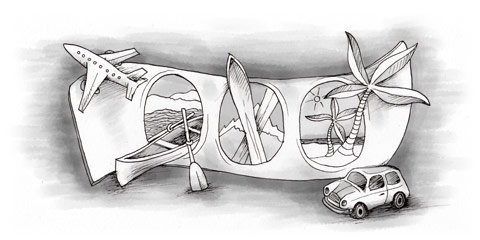When you sell a second-hand car in Spain, you must pay transfer tax ( impuesto sobre transmisiones patrimoniales y actos jurídicos documentados/ ITP), which is 4 per cent of the vehicle’s ‘fiscal’ value. The fiscal value of a car when new is decided by the tax office, which publishes a list of values for all new cars sold in Spain. The fiscal value is reduced each year (e.g. by 12 per cent when a vehicle is between one and two years old) until it’s ten or more years old, when the fiscal value is 10 per cent of the new value. It’s the responsibility of the seller to pay the tax, and most sellers include the tax in the sales price (so check in advance what it is).
The tax must be declared on form 620 ( compra-venta de vehículos usados entre particulares), obtainable from a tobacconist ( estanco) or tax office ( hacienda), and paid within 30 days of selling your car. Payment is made at the provincial tax office ( Consejería de Hacienda) of the regional government, e.g. the Junta de Andalucía, where you must present your passport or identity card. You can use a gestor to handle the paperwork for you.
When selling a car, you should also do the following:
- complete, sign and date the reverse of the registration document ( permiso de circulación) under the section transferido and take it directly to the provincial traffic department along with your other car papers, such as the ITV test certificate, municipal tax receipt and a form from your local town hall on which you’ve de-registered your ownership (for municipal tax reasons);
- inform your insurance company;
- if you’re selling your car privately, insist on payment in cash or with a banker’s draft ( cheque bancario), which is standard practice in Spain. If you cannot tell a banker’s draft from a personal cheque, insist on cash. Never accept a personal cheque.
- include in the receipt the price paid, the car’s kilometre reading and a statement that you’re selling the car in its present condition (as seen) without a guarantee ( sin garantía), signed by the buyer.
Although it’s the buyer’s responsibility to re-register the vehicle in his name within 30 days of purchase, many fail to do this (to avoid paying a change of registration fee of €42.60), so unless the buyer accompanies you to the tax or government office, it’s in your interest to pay this fee (you must present a bill of sale signed by the buyer). If the buyer then fails to re-register the vehicle, you won’t receive any fines for parking and motoring offences committed by him, which you would otherwise.
The best place to advertise a car for sale is in local newspapers, expatriate newspapers, on free local notice boards, and in the Friday and Saturday editions of major newspapers. Many people also put a ‘for sale’ ( se vende) notice on their car with a telephone number and park it in a prominent place.
Finally, you should be wary of thieves posing as buyers. Never allow a prospective buyer to drive your car alone or even to sit in the driving seat when you aren’t in the car (unless you retain the ignition keys). There have been a number of cases of crooks driving off with cars after duping the owner into getting out.
This article is an extract from Living and Working in Spain.
Click here to get a copy now.




